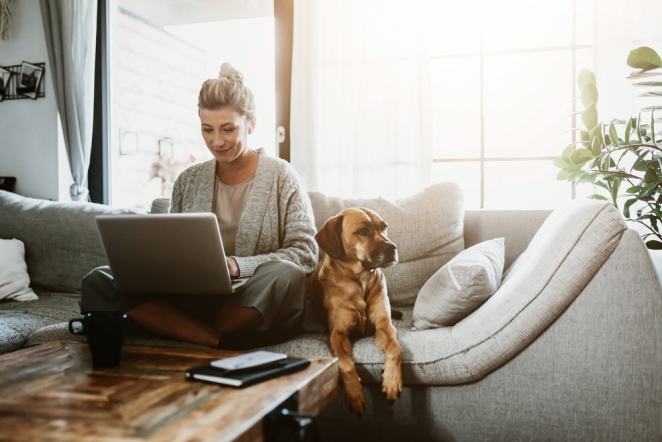There is a lot to be said for the life of the freelancer. The freedom, the flexibility, and the lack of people to answer to (besides your clients, of course) makes it a tempting path for many. I myself was tempted 15 years ago now and I’ve never looked back. Indeed, I’ve almost forgotten what it’s like to have a boss in the traditional sense.
But I’m also a man that’s suffered with various degrees of mental health problems my entire adult life and while life as a freelance writer can be incredibly liberating it can also be quite frustrating and lonely. The cliches are true and yes, I’ve sat at my laptop working on Caribbean beaches, cruise ships and idyllic log cabins from time to time. But far more often than that, it’s been working alone in my office with only the dogs for company.
I wouldn’t have it any other way, but I understand and appreciate that, for some, freelancing can bring with it some unique challenges as far as mental health is concerned. So, as we close out our mental health month, I’ll be sharing some of the tips I’ve learned to help alleviate the loneliness and brain fog that can seep through the cracks on particularly bleak days while working from home on a project for a team of people you’ll probably never meet in person.
1. Don’t stop moving

I don’t mean you should get up and have a merry jig every 30 minutes (though if that’s your bag, go ahead) but you should certainly spend at least an hour a day getting out of the house to go for a walk. I have two dogs and live in the countryside so the incentive is already there, but even pet-free freelancers living in city centres should spend at least an hour a day just going for a walk.
Yes, you can try yoga and meditation and all that good stuff, of course, but start with a simply daily walk and work your way up from there. It’ll give your mind a chance to clear after hours of staring at a screen too and you might return from your walk with a fresh perspective on your work.
2. Set up an actual office

When I first moved into my house about 5 years ago, the place was (literally) a building site and it took about 4 months for my office to be ready. In those months, the lounge and bedroom were the only habitable rooms and became my living and workspace. It. Was. Horrid.
Without the separation and work and home, everything feels like work. Even sitting on the sofa in the evening watching tele, you feel like you should be checking your emails. For the sake of your mental health, you need a home office that’s comfortable, well-lit and has THE BEST WI-FI.
3. Diversify

The flexibility of freelancing doesn’t just have to do with when and where you work. In the creative industries particularly there’s plenty of opportunity for diversifying your skills and branching out into other areas. This can really help to calm the naggin boredom and procrastination that can reveal themselves when you’re doing the same thing every day for the same clients.
If you feel like you’re stuck in a rut, then branch out. Try and find some new clients, learn a new piece of software that might open up new work avenues for you or just do something creative and hope it turns into something you can draw monetary value from. The more skills and clients in your bank, the more you will learn and the more (temporarily) employable you will be. Just don’t try pushing the boat out too far. Just because you’re a great illustrator that doesn’t mean you’ll make a great coder.
4. Network with others

Freelancers are, by nature, quite isolated individuals. On the average day the only contact I’ll have with another human being is generally by video conference or telephone and there’s a definite disconnect there even in the aftermath of the pandemic when Zoom became second-nature. So don’t be an island.
Use resources like Creativepool (it’s rather good, you know) to reach out and develop networks of likeminded friends and fellow freelancers. You might occasionally recommend each other to clients or even offer to take some work off their hands every once in a while, when the work isn’t exactly breaking your door down.
5. Work the hours you’re comfortable with

Finally, a controversial one. Many other creatives will tell you that you must set a strict work routine between 9-5 and switch your work brain off when everyone else is doing likewise. For me, I say fuck that. Personally, I’m a night owl and have always done my best work at night, even as a small boy. So, I rarely work 9-5. I work around my clients and around my social obligations and that’s what keeps me sane and allows me to have a relatively strong social life.
Want to work 8-12, go meet a friend in town, come home, work 2-4, take a nap, have dinner and then work 8-11 before giving yourself a couple of hours before bed to yourself? Go nuts. The world is your oyster. The important thing is not so much when you work but how much you work. If your mind works better at night, works nights. If it works better early in the morning, get up at 4am instead of 6am. It’s up to you. And you can always fit a nap in later anyway.
That, in a nutshell is why I adore freelancing. The lack of paid holiday is a bummer, yes, but the ability to work the way you want to work means it’s arguably the best way to achieve a decent work/life balance and pacify your mental health.






